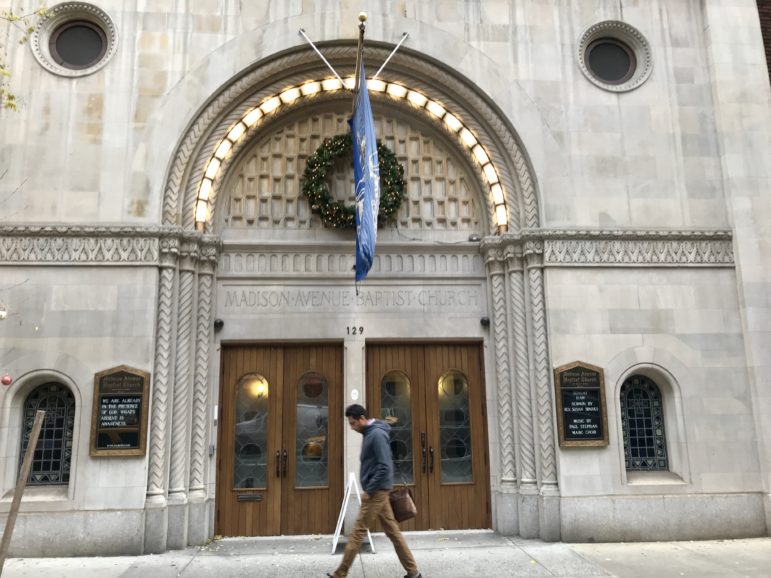
Virginia Jeffries
As church attendance continues to decline, many 12-step groups that meet in New York church basements and rectories after business hours have had to close or move when the churches sold off property or raised the rents to cover the church's own expenses.
Four people sat around the long table at the Murray Hill Beginners Al-Anon meeting, a support group for families and friends of alcoholics. Outside, it was already dark at 6:30 p.m. and the large conference room at NYU-Langone Medical Center, which overlooked the FDR Drive and the East River, looked empty.
The group used to expect dozens of attendees on an average weeknight, but numbers have plummeted since it was forced to leave its first home, Madison Avenue Baptist Church, for financial reasons.
The Murray Hill Beginners group is not alone. As church attendance continues to decline, many 12-step groups that meet in New York church basements and rectories after business hours have had to close or move when the churches sold off property or raised the rents to cover the church’s own expenses.
The 12-step groups that can’t make the new rent either close or move to new locations that can be inconvenient to the communities they served.
“We had more of a crowd back then because everybody could get there,” says Chris, a member of the group that used to meet at Madison Avenue Baptist Church and who, like most anonymous support group members, uses only one name to protect his anonymity. “Langone is so far east that only people who are going to be on the east side are going to come.”
The financial pressures on churches are part of a larger shift for religious institutions, says Michael Castrilli, business fellow at Villanova University’s Center for Church Management, and co-author of “Parish Finance: Best Practices in Church Management.”
“In northeastern cities, the general trend is a decline in church attendance, and in collections,” says Castrilli.
Besides the loss in revenue, increasing administrative costs such as liability insurance are also squeezing church budgets, Castrilli says. Madison Avenue Baptist Church felt such a squeeze and closed the parish house where the Murray Hill Beginners had met.
“It cost a great deal of money to maintain and run the parish house,” says Brian Crowson, the parish administrator.
Besides the Murray Hill Beginners, the church also rented its space to three Alcoholics Anonymous meetings, charging each group $10 a week in rent, well below the going rate.
“Offering the space to those groups fulfilled the church’s mission to engage with the wider community,” says Crowson. “It was difficult to give those up after the closure.”
The AA and Al-Anon groups also experienced difficulties.
“We visited or called every church between 96th Street and Houston Street,” says Roy, another member of Murray Hill Beginners. “Nobody got back to us, or they got back to us and quoted astronomical rates.”
The price for each weekly 90-minute meeting ranged from $30 to $50.
“Can you imagine how many people that is – at $2 per person – that you have to collect every week?” says Roy.
While the AA meetings moved to another church on Park Avenue, the Murray Hill Beginners struggled to find a new site within their budget.
After several months, Chris approached NYU-Langone which offered him the current space, surprisingly, for no charge.
“I haven’t heard of any other situations like that in the city,” says Chris. He says the group treasurer has offered to pay them, but hospital administrators have declined, saying their budget system is not set up to take payments.
Another member has a more cynical explanation.
“This place is a hospital,” says Roy. “And hospitals – like pharmaceutical companies – are the only ones making money these days.”








